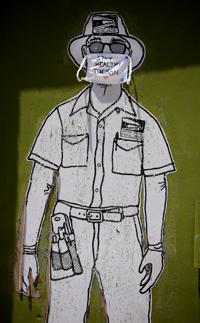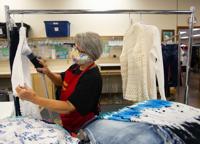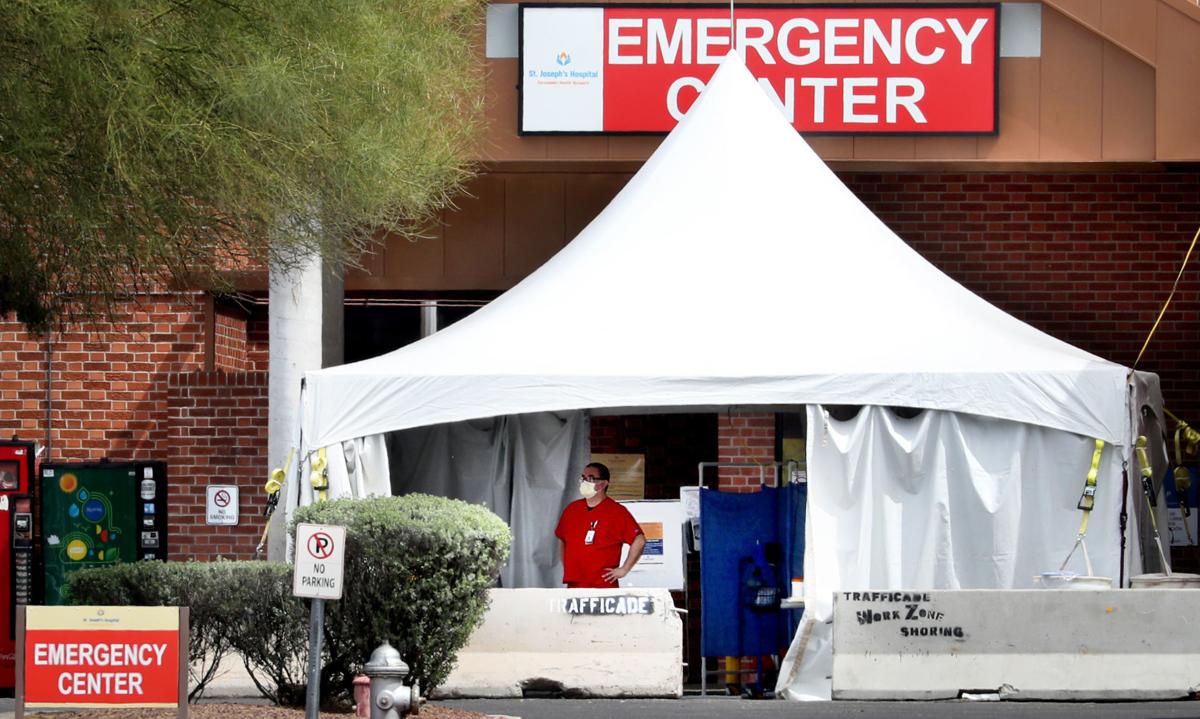Arizona hospitals that are expected to be able to treat new cases of coronavirus without going into crisis mode were above 80% capacity Tuesday, a milestone that should trigger an automatic stop to elective surgeries at affected hospitals.
The report showing statewide hospital bed use at 83% of capacity, released Wednesday by the Department of Health Services, comes as the state deals with a surge in virus cases and hospitalizations that experts say is likely tied to Gov. Doug Ducey’s ending of statewide closure orders in mid-May.
Ducey has been criticized for not adding requirements that could prevent a surge, and some say the time to put those measures in place has come.
“If we don’t do some things right now, we’re going to end up either at a stay-at-home order or overcapacity or both,” former state health director Will Humble said. “But the things that we can do now, they’re going to take time to work.”
They include better infection control in nursing homes, masks in public and allowing cities to crack down on bar districts where social distancing has been ignored, Humble said. Ducey did none of those things when he lifted his orders last month.
Halting elective surgeries would greatly affect patients, since surgical procedures influence their quality of life in measurable ways and are needed. And a halt would be a major financial blow for hospitals who get a major portion of their revenue from procedures. Many hospitals instituted furloughs, pay cuts or other savings measures during the first ban on elective surgeries.
The number of hospitals affected was not immediately available from the state Department of Health Services on Wednesday. And none of the hospital chains contacted by The Associated Press said they were halting surgeries. Banner Health, the state’s largest system with about half the state’s beds, said it was below the threshold.
But there are some hospitals that have acted, said Ann-Marie Alameddin, president and CEO of the Arizona Hospital and Healthcare Association.
“I have heard of hospitals that have canceled procedures to make sure they are preserving that extra capacity,” Alameddin said. “It’s a financial issue, but hospitals are going to manage their patient care appropriately to make sure they can meet the needs of the community if there is a patient surge.”
Ducey halted elective surgeries March 19 to preserve personal protective equipment such as masks and gowns in the early part of the pandemic. The rules established under an executive order Ducey issued in April that allowed hospitals to resume elective surgeries are clear: Hospitals can only perform them if they have at least 20% of their beds available. Other requirements include adequate supplies of personal protective equipment, robust testing of all at-risk health-care workers and patients scheduled for surgeries, and prioritizing elective surgeries based on urgency.
Arizona hospitals were at 83% of capacity Tuesday, up from 78% the previous day, according to state data. The state also exceeded 80% one day last week.
The state has seen a major surge in virus patients that started about 10 days after Ducey’s stay-home order and other restrictions ended May 16. That’s about the period of time it takes the virus to begin causing symptoms in patients.
The state reported 1,556 new cases Wednesday and 25 new deaths. That brings the total cases to 29,852 and deaths to 1,095.
Pima County had 3,350 total cases Wednesday — 189 of them new. Coronavirus deaths reached 216.
For most people, the new coronavirus causes mild or moderate symptoms, such as fever and cough that clear up in two to three weeks.
For some — especially older adults and people with existing health problems — it can cause more severe illness, including pneumonia, and death.
Dr. Marjorie Bessel, Banner’s chief clinical officer, has been urging the public to take steps to slow the spread of the virus. They include wearing masks, limiting exposure in public spaces and frequent hand-washing.
“We do have an ability to mitigate the spread of this virus right now — it’s not necessarily the message that people always want to hear, but it is the message of what we know about the virus,” she said.
Not taking those steps will impact people needing care at hospitals and the health workers who will be overworked. And if Banner is forced to end elective surgeries, that’s a big deal, she said.
“Elective surgeries — they’re a little bit of a misnomer,” Bessel said. “These are necessary surgeries — they’re medically necessary surgeries.”
That means they are needed surgeries, just not so urgent that they need to be done immediately.
“Anybody who’s had a surgery knows that,” she said. “If you need a surgery, you need a surgery.”
Photos for May 29: Tucson gets by during Coronavirus Pandemic
Tucson gets by during coronavirus pandemic
Updated
The iconic Casa Molina bull and matador statue both sport masks on the first full week of the loosening of COVID19 restrictions, May 23, 2020, Tucson, Ariz. The bull previously had a mask on the testicles.
Tucson gets by during coronavirus pandemic
Updated
Michelle Leon Cordova, right, mother, and her son Sahuarita High School senior Lino Cordova, whom is fighting cancer, wave at staff members from Diamonds Children Center, friends and the Marana Police Department during a car parade, celebrating Lino's graduation, outside of his home on May 13, 2020 in Sahuarita, Ariz. Cordova stood on the sidewalk while the team from Diamond Children Center, friends and the Marana police department gave Cordova a graduation gar parade. Cordova was given a gift basket with his favorite snacks, gift cards as well as other items he enjoys. The car parade, also, celebrated another graduating senior fighting cancer from Empire High School, Noah Nieto. Nieto, also, received a gift basket with snacks, gift cards and other items Lino enjoys.
Tucson gets by during coronavirus pandemic
Updated
Michelle Leon Cordova, right, mother, brings celebration balloons to a car after staff members from Diamonds Children Center, friends and the Marana Police Department celebrate Sahuarita High School senior Lino Cordova, whom is fighting cancer, graduation with a car parade outside of his home on May 13, 2020 in Sahuarita, Ariz. Cordova stood on the sidewalk while the team from Diamond Children Center, friends and the Marana police department gave Cordova a graduation gar parade. Cordova was given a gift basket with his favorite snacks, gift cards as well as other items he enjoys. The car parade, also, celebrated another graduating senior fighting cancer from Empire High School, Noah Nieto. Nieto, also, received a gift basket with snacks, gift cards and other items Lino enjoys.
Tucson gets by during coronavirus pandemic
Updated
Personnel from Tucson Medical Center line the heliport to watch A-10's from Davis-Monthan Air Force Base's 355th Wing and F-16's from the Arizona Air National Guard's 162nd Wing make a pass over the facility, one leg of an area wide community flyover, May 14, 2020, Tucson, Ariz.
Tucson gets by during coronavirus pandemic
Updated
Nancy Celix-Campos, right, a respitory therapist at Tucson Medical Center, watches the military flyover with her daughters, Giana, 12, and Jazmyn, 8, from Sentinel Peak on May 14, 2020. Two F-16 Fighting Falcons from Arizona Air National GuardÕs 162nd Wing and two A-10 Thunderbolt II's from the 355th Wing, assigned to Davis-Monthan Air Force Base, fly over Tucson area hospitals to honor healthcare personnel and first responders as they are some of the frontline workers dealing with the coronavirus disease (COVID-19) head on. "It's been an exhausting two to three months," says Campos, "it's pretty cool, I like how they're going by each hospital."
Tucson gets by during coronavirus pandemic
Updated
Two F-16 Fighting Falcons from Arizona Air National Guard’s 162nd Wing and two A-10 Thunderbolt II's from the 355th Wing, assigned to Davis-Monthan Air Force Base, fly over Northwest Medical Center north of Tucson on May 14, 2020.
Tucson gets by during coronavirus pandemic
Updated
A letter carrier portrait on the Ok Market building, located in the Armory Park neighborhood, is adorned with a face mask on May 18, 2020.
Tucson gets by during coronavirus pandemic
Updated
Rosemary Garcia waits for a family member outside of a store at Park Place Mall, 5870 E. Broadway Blvd., in Tucson, Ariz. on May 19, 2020. Malls reopened today under CDC guidelines and Gov. Ducey's new rules for businesses due to the Coronavirus pandemic. Park Place Mall has signs throughout the mall reminding customers to keep a six feet distance as well as hand sanitizer stations near each entrance. About half of the tables in the food court have been removed to allow for social distances as well as less than half of the stores have opened with new guidelines. Of the stores open, only 10 customers are allowed to shop in each store at a time.
Tucson gets by during coronavirus pandemic
Updated
Pat Schlote steams clothing before it is put on the sales floor at the Golden Goose Thrift Shop in Catalina, Ariz., on May 21, 2020.
Tucson gets by during coronavirus pandemic
Updated
Ada Contreras, teaching assistant, looks through containers while reorganizing toys at Herencia Guadalupana Lab School, 6740 S. in Tucson, Ariz. on May 21, 2020. As Child care centers begin to re-open when they are ready, Herencia Guadalupana Lab School is reorganizing and cleaning everything in the facility before re-opening on June 2. To allow for social distancing and decrease the amount of items children touch, Herencia Guadalupana Lab School has sheds where items will go as well as placing items in containers organized by category.
Tucson gets by during coronavirus pandemic
Updated
Jen Martinez, right, softball coach, teaches Skylar Reilly about hitting during a session at Centerfield Baseball Academy, 5120 S. Julian Dr., in Tucson, Ariz. on May 21, 2020. After re-opening on Monday, Centerfield Baseball Academy has implemented new policies in response to the Coronavirus Pandemic such as wearing masks, cleaning, signage, hand sanitizer and limiting the amount of people inside the facility.
Tucson gets by during coronavirus pandemic
Updated
Karl Bosma, left, and George Cantua, with facilities and maintenance, lay down stickers to mark six-foot separation distance around one of the baggage carousels, part of the efforts at Tucson International Airport to work within the restrictions of COVID19, May 22, 2020, Tucson, Ariz.
Tucson gets by during coronavirus pandemic
Updated
A lone passenger waits for a flight near one of the shuttered restaurants in the B Gates before Memorial Day at Tucson International Airport on May 22, 2020.
Tucson gets by during coronavirus pandemic
Updated
Drew Cooper on the stage in the St. Philip's Plaza courtyard, May 22, 2020, Tucson, Ariz., where live music is back on the schedule.
Tucson gets by during coronavirus pandemic
Updated
Many people visit Tumamoc Hill during the first day of Tumamoc's re-opening in Tucson, Ariz. on May 25, 2020. After being closed due to the Coronavirus pandemic, Tumamoc Hill re-opened with some modifications. There are hand sanitizer stations throughout the hike to the top as well as arrows, spaced 10-ft apart, lined up and down the hill. Some runners, hikers and walkers are also wearing masks during their hike. "The steps we are taking aim to provide our community with needed exercise, connection to our beautiful desert and a sense of comfort in such a trying time, while balancing the fact that gathering as a community endangers each of us and our loved ones. This is an unprecedented challenge that we are taking extremely seriously," said Benjamin T. Wilder, director of Tumamoc Hill. Visitors are also asked to limit their group to three people and to not touch the gate at the top of the hill- a tradition for some who make it to the top. "This is a time when we need to establish new traditions and adapt in a creative manner that embraces empathy, unity, care and patience," Wilder said.
Tucson gets by during coronavirus pandemic
Updated
Pen Macias, artist, works on part 2 of a mural for a client on E. Broadway Rd., between S. Columbus Blvd. and S. Alvernon Way, in Tucson, Ariz. on May 25, 2020. Macias, known as The Desert Pen, has been working on her clients mural for the past three months. "It's the one thing I love, I have a passion for and the only thing I could be happy doing," said Macias. The mural represents her client, a single mother of four who works in the health care field. One half of the mural is dedicated to the connection between mothers and their children. The other half is dedicated to the connection between nurses and patients. The client wanted some positivity in the mural to show how nurses give a piece of themselves to their patients hence the puzzle pieces in the nurse and the patients, said Macias.
Tucson gets by during coronavirus pandemic
Updated
Christina Cortinas, posing at her home, May 28, 2020, Tucson, Ariz., with a photo of her and her mother, Catherine Rodriguez, in San Diego, 1991. Rodriguez is currently in assisted living and fighting COVID19. Cortinas hasn't seen her mother in months, the longest such span in her life.
Tucson gets by during coronavirus pandemic
Updated
Ruben Lopez looks through handouts while attending a Eviction Resource Fair with his family outside the Pima County Justice Court.





